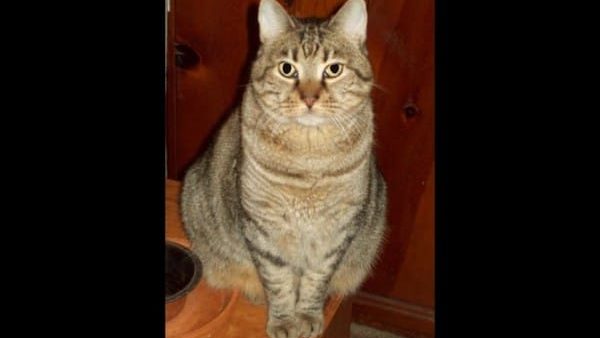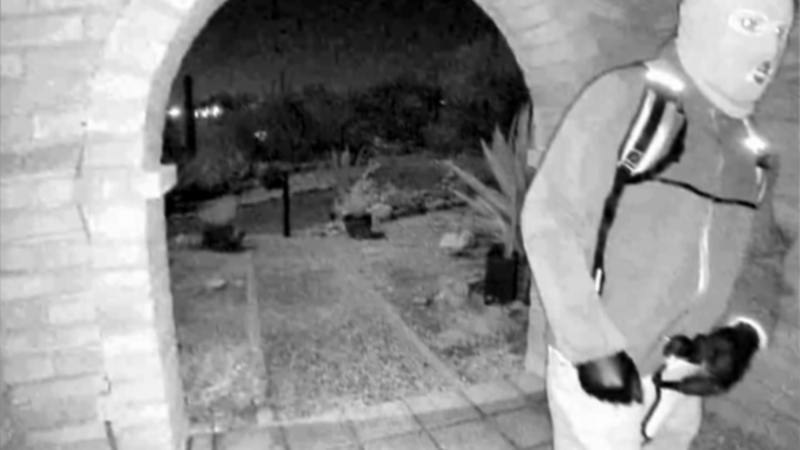Remembering April 27: Not all Losses were Human
Tiger, a cat belonging to Leah and William Alford, survived the tornado that hit Tuscaloosa on April 27, 2011. But the cat disappeared and has not been seen since.
Thousands of Alabamians have spent the last five years rebuilding their lives after tornados tore through the state on April 27, 2011. The residents of Tuscaloosa’s Forest Lake neighborhood are among them.
The area has few trees now and still bears the hallmarks of the slow recovery with rebuilt homes right across from overgrown, grassy lots. On one corner is a home that belongs to William Alford.
William and his wife Leah are cat people. He says all the animals they’ve owned except for one have been rescues.
That includes Tiger.
William says Tiger was a feral cat in the neighborhood. They captured and adopted him.
“He was a great cat,” says William. “He was her most special friend. He loved Leah.”
Tiger got its name because of its stripes.
When the Tornado Hit
Five years ago, Leah’s mother lived here with Tiger and a few other cats. William and Leah were with her mom that afternoon. As the tornado barreled toward Tuscaloosa, the three of them headed into the bathroom in the center of the house.
“[I] grabbed a couple of the animals, got us all in there,” says William. “But in all the confusion, before I could get the door shut, they fled out into the house.”
Once the storm passed, they got Leah’s mom to the hospital. William looked for the animals in the rubble. He found them safe, but couldn’t find Tiger. Then he looked under the bed.
“[Tiger] had hidden under the bed and survived the storm. He wouldn’t come to me,” says William. “I reached under trying to get him out and I actually touched him. So I picked up the mattress to try and get to him and he fled and disappeared under the rubble never to be seen again.”
William scoured the neighborhood. They visited the animal shelter regularly. Neighbors reported Tiger sightings.
“We put out clothes that may have our odor on it that he might come to,” says William. “Put his bedding out that he might find. Put food out every day that was his food hoping he would come back.”
Since the Storm
After a while, the larger recovery took over. Leah’s mom survived the tornado impact, but it led to pneumonia. She died five months later. William worked on rebuilding.
All that time getting the house back in shape gave him a chance to watch the cats roaming the neighborhood streets. He even saw some popping in and out of the sewers, like a feline subway. He says he and the neighbors captured and rehomed about a dozen. The cats were easy to trap because there was little food.
“There are no birds because there were no trees,” says William. “Actually five years later, just two weeks ago, I saw the first squirrel.”
Nowadays he leaves food and water for just one cat in bowls behind the house, a one-eyed cat they’ve named Jack. He says that animal disappeared for more than six months before showing up again. Tiger hasn’t come back.
William says he’s come to terms with Tiger’s disappearance. Leah holds out hope the cat will return.
It’s a reminder the pain from the tornados isn’t just about lost people, but the loss of the animals we share our lives with.
Pakistan-Afghanistan border closures paralyze trade along a key route
Trucks have been stuck at the closed border since October. Both countries are facing economic losses with no end in sight. The Taliban also banned all Pakistani pharmaceutical imports to Afghanistan.
Malinowski concedes to Mejia in Democratic House special primary in New Jersey
With the race still too close to call, former congressman Tom Malinowski conceded to challenger Analilia Mejia in a Democratic primary to replace the seat vacated by New Jersey Gov. Mikie Sherrill.
A daughter reexamines her own family story in ‘The Mixed Marriage Project’
Dorothy Roberts' parents, a white anthropologist and a Black woman from Jamaica, spent years interviewing interracial couples in Chicago. Her memoir draws from their records.
FBI release photos and video of potential suspect in Guthrie disappearance
An armed, masked subject was caught on Nancy Guthrie's front doorbell camera one the morning she disappeared.
Reporter’s notebook: A Dutch speedskater and a U.S. influencer walk into a bar …
NPR's Rachel Treisman took a pause from watching figure skaters break records to see speed skaters break records. Plus, the surreal experience of watching backflip artist Ilia Malinin.
In Beirut, Lebanon’s cats of war find peace on university campus
The American University of Beirut has long been a haven for cats abandoned in times if war or crisis, but in recent years the feline population has grown dramatically.






